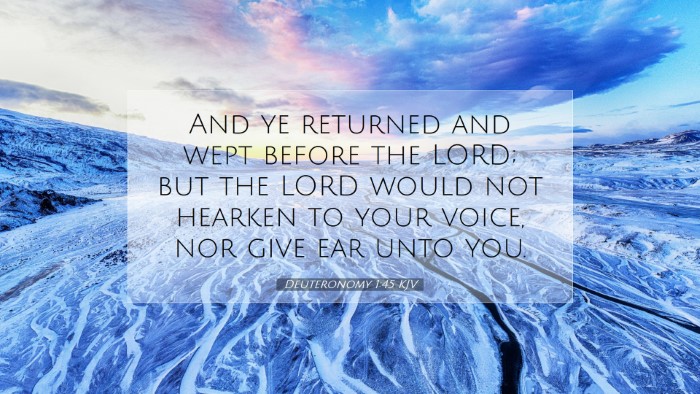Commentary on Deuteronomy 1:45
Verse Reference: Deuteronomy 1:45 - "And you returned and wept before the Lord; but the Lord would not listen to your voice, nor give ear to you."
Introduction
This verse is a pivotal moment in the historical narrative of the Israelites as they journey towards the Promised Land. It encapsulates themes of disobedience, judgment, and the deep relational dynamics between God and His people. In this analysis, we draw from the insights of esteemed public domain commentators to unpack the depth of meaning in this verse.
Contextual Background
The preceding chapters provide context to the Israelites' failures and subsequent plea for God’s mercy. After receiving a negative report from the scouts about the land of Canaan, they rebel against Moses and express fear, demonstrating a lack of faith in God's promise. Deuteronomy is a series of speeches given by Moses, reminding the next generation of their history and God's covenant.
Matthew Henry's Commentary
Insight on Israel's Response: Matthew Henry reflects on the profound sadness of the people as they return to God after their rebellion. He notes that the weeping was an expression of despair over their circumstances and the consequences of their lack of faith. Henry emphasizes that their return to the Lord, although genuine in emotional expression, did not lead to a change in their status.
God’s Silence: Henry sharply points out that despite their tears, God's refusal to listen indicates a solemn lesson on the consequences of prolonged disobedience. When they pursued repentance out of fear rather than heartfelt remorse, God remained silent, demonstrating that true repentance requires more than mere emotion—it demands a heart turned toward obedience.
Albert Barnes' Commentary
Reflection on God's Justice: Albert Barnes underscores the justice of God's actions in this verse. He articulates that the Israelites had crossed a threshold; their previous opportunities for repentance had been neglected, leading to a divine verdict that would not be reversed. God's justice is portrayed as absolute, reinforcing the notion that while He is merciful, He is also righteous in His decisions.
The Warning for Future Generations: Barnes insists that this narrative serves as a serious warning to future generations of Israel and beyond. He suggests that the spiritual lethargy displayed by the Israelites ought to trigger introspection among believers today regarding the importance of heeding God's voice and commandments while they still have the opportunity.
Adam Clarke's Commentary
Viewing Weeping as a Sign of Repentance: Adam Clarke discusses the nature of the Israelites’ mourning. He acknowledges their tears as a form of emotional repentance, yet he argues that it was insufficient without a genuine change of heart and purpose. Clarke states that while tears are welcome to God, they must be accompanied by action to align with His will and purpose.
The Nature of Divine Dismissal: Clarke elaborates on the gravity of God's dismissal of the people's cries. He highlights that this situation underscores the principle that there are times when repeated disobedience results in God's silence. It can serve as a stark reminder of the seriousness of sin and the consequences that arise from turning away from God's commands.
Theological Implications
The theological ramifications of Deuteronomy 1:45 echo throughout history and can be dissected into several key areas:
- The Nature of God: This verse illustrates the tension between God’s mercy and justice. God desires for His people to return to Him, yet His holiness requires that He act justly against disobedience.
- Repentance: True repentance is not merely emotional but must lead to obedience and a realignment with God’s will. The Israelites’ weeping serves as a cautionary tale against superficial repentance.
- Human Responsibility: The narrative emphasizes that humans bear responsibility for their actions. The failure to trust and follow God leads to dire consequences, both for the individual and the community.
- The Role of Prayer: The dismissive nature of God's response to the Israelites’ cries highlights the importance of genuine prayer that stems from a heart aligned with God’s purpose, rather than one filled with self-interest or fear.
Conclusion
Reflective Application: Deuteronomy 1:45 serves as a crucial learning tool for pastors, theologians, and scholars alike. It invites a reflective engagement on the nature of true repentance, the seriousness of disobedience, and the profound relationship between a holy God and His chosen people. As we examine our own lives and communities, may we strive for a kind of repentance that is transformative, leading us back to the heart of God.


